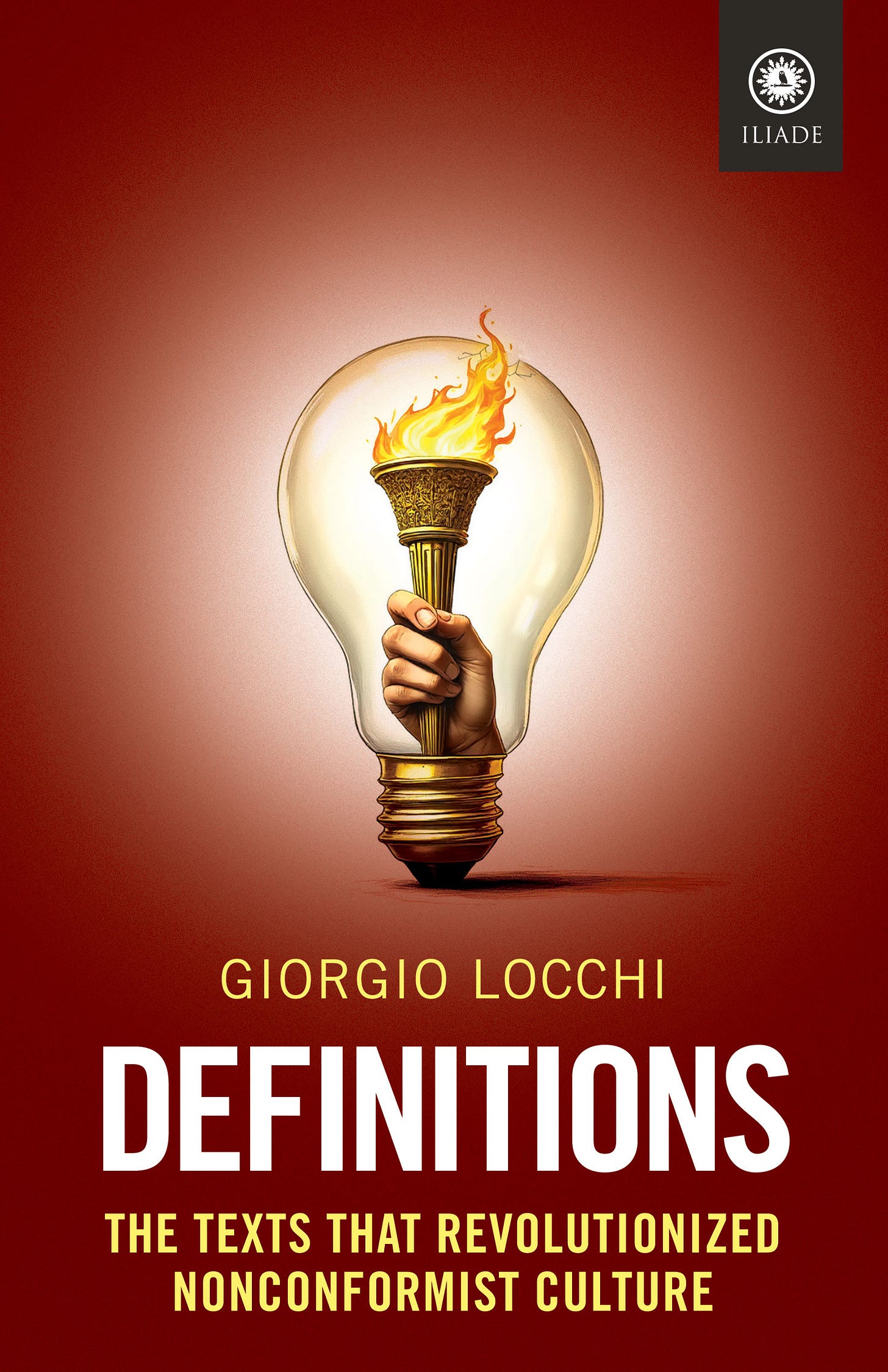Giorgio Locchi’s Definitions is a comprehensive collection of essays that outline a sophisticated philosophical and cultural vision for European identity and renewal. Locchi was not known for having a massive quantity of works. However, the quality of his writings is unmatched. Locchi was one of the most influential figures in the European New Right — even considered by Guillaume Faye to be a principal influence on his own thought. This collection brings together some of Locchi’s most important writings on topics ranging from Indo-European identity to structural anthropology, from Wagner to Nietzsche.
The book is organized into three main sections — “Destiny,” “Roots,” and “Figures” — each exploring different aspects of European cultural and philosophical heritage. What makes this collection particularly valuable is how it weaves together multiple intellectual traditions while maintaining a coherent vision throughout.
One of the book’s central themes is the concept of historical time and how it shapes cultural identity. Locchi presents a sophisticated understanding of history that goes beyond simple linear progression. As he explains in “History and Destiny”:
By history we understand the way of becoming proper to man as such (and man alone). Only man develops historically. Therefore, to ask the question of the meaning of history, that is, of its goal and signification, is to wonder if man himself, who is in history and who (willingly or not) makes history, has a meaning.
This understanding of history as fundamentally human and meaning-creating stands in contrast to both purely cyclical and purely linear conceptions of time. Locchi develops what he calls a “spherical” conception of history, where past, present, and future exist in a dynamic relationship.
The book’s treatment of Indo-European identity is particularly noteworthy. Rather than approaching it as merely historical or archaeological fact, Locchi sees it as a living cultural inheritance that can inform contemporary European self-understanding. As he writes:
The Indo-European fact only enters history and becomes historically active once ‘discovered,’ that is, at the moment a human consciousness, bound to a peculiar ‘epochal’ perspective — our own consciousness and perspective — reconstructs it as the past of its own present.
This perspective allows Locchi to avoid both naive romanticism about the past and dismissive modernism. Instead, he presents cultural inheritance as something that must be actively interpreted and renewed.
One of the book’s most compelling sections deals with myth and community. Locchi argues that myth isn’t simply primitive storytelling but rather a fundamental way that communities organize their understanding of themselves and their place in the world. He writes:
Myth, as I understand it, enters history to create itself, creating and organizing its own elements. Myth is that historical force which enlivens a community, organizes it, launches it upon its destiny.
This understanding of myth leads to a sophisticated analysis of how communities maintain their coherence while also evolving over time. Rather than seeing tradition as mere preservation, Locchi presents it as an active force for cultural renewal.
The book’s analysis of Wagner’s Ring cycle demonstrates how Locchi applies his theoretical framework to specific cultural works — particularly those of Richard Wagner. His reading goes beyond simple interpretation to show how Wagner’s work represents a fundamental reimagining of European mythic traditions for the modern age. The detailed analysis reveals how artistic works can serve as vehicles for cultural self-understanding and renewal.
One of the book’s most valuable contributions is its discussion of technology and modernity. Rather than simply rejecting or uncritically embracing technological progress, Locchi presents a nuanced view of how societies can maintain their cultural integrity while engaging with technological change. This comes through particularly in his discussion of Spengler’s Man and Technics.
The final section of the book, dealing with various intellectual figures, shows how Locchi’s ideas connect to broader traditions of European thought. His treatment of Nietzsche is particularly insightful, showing how Nietzschean ideas can be understood within a larger framework of cultural renewal.
The book’s concluding essay, “Europe Is Not an Inheritance but a Future Mission,” encapsulates many of its key themes. Locchi argues that European identity cannot be understood simply as preservation of the past but must be oriented toward the future:
If we want to talk about Europe, make plans for Europe, we must think of Europe as something which has never been: something whose meaning and identity remain to be invented. Europe has never been and can never be a ‘fatherland,’ a ‘land of our fathers’; it can never be planned, projected, except, in Nietzsche’s words, as a ‘land of our sons.’
This forward-looking perspective, grounded in a deep understanding of cultural and philosophical traditions, makes Definitions a valuable contribution to discussions about European identity and cultural renewal. Locchi’s greatest strength lies in his ability to combine deep scholarly understanding with a vision for cultural renewal that goes beyond both simple conservatism and rootless progressivism. Locchi is very dense and complex but you will be rewarded with a rich and nuanced understanding of how cultures maintain their vitality while evolving over time.
Definitions is an important work for anyone interested in questions of cultural identity, historical understanding, and the possibilities for meaningful cultural renewal in the modern world. Its combination of philosophical depth and cultural awareness makes it a valuable resource for thinking through some of the most pressing questions facing European society today.










